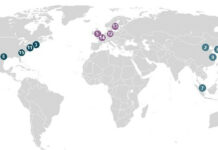 It’s getting ugly across the pond, where our European friends are discovering that embracing a single currency and wiping out borders between member states doesn’t mean you’re happily married forever after.
It’s getting ugly across the pond, where our European friends are discovering that embracing a single currency and wiping out borders between member states doesn’t mean you’re happily married forever after.
The break-up-the-EU crowd–a.k.a. Eurosceptics (that’s the way they spell it)–got the most votes in this month’s European parliamentary elections in several EU member countries, notably France and the U.K.
The underlying issue seems to be a backlash against immigration. Actually, immigration may not be the right term to use since the adoption of the EU passport wiped out visa requirements across the continent. A number of Europe’s more restless tribes (and their overseas relatives) have taken to “visiting” a country and staying, declaring themselves residents.
When he was president of France, Nicolas Sarkozy famously tried to evict a settlement of Roma people (they used to be called Gypsies) only to discover they could return the next day under the rights granted to them by the EU passport. During the EU parliamentary campaign, Sarkozy emerged to declare that every EU member should have the option of imposing its own immigration restrictions.
Sarko, who apparently is planning to run for president again, can be considered a moderate on the EU immigration issue. If you want a taste of the raw meat being served up on this divisive subject, sample this morsel from the far-right National Front candidate, Marine Le Pen:
“Europe’s immigration problem will be solved by the Ebola virus,” Madame Le Pen opined a few days before the EU parliamentary election. Her party finished first in France by a wide margin.
Fortunately, things are a bit more civilized on this side of the Atlantic. Last year, the U.S. Senate passed a sweeping immigration reform bill that would grant legal status to the estimated 12 million undocumented immigrants residing in the United States. The House of Representatives appears to be running out of excuses for blocking a vote on the bill, and the pressure to pass it–or something similar–likely will increase as the November election approaches. Under current law, the child of an undocumented immigrant who grows up in the U.S. and volunteers to serve in the U.S. military can’t apply for citizenship after completing a tour of duty.
But even without federal reforms, many U.S. communities are welcoming an influx of foreigners–especially those with pockets full of cash–as a net positive for economic development. Most welcome of all is an influx of foreign investment. So it shouldn’t be surprising that the idea of tying visas to moolah is catching on.
This week comes news that the Economic Development Dept. in Austin, TX has recommended the creation of an “immigrant investor” program through a partnership with several existing private foreign visa centers in Texas. According to a report in the Austin Business Journal, a May 22 memo sent to the mayor and City Council says the ED Dept. hopes to work out a partnership and set up a pilot program before the end of the summer.
The program will make use of EB-5 visas, which allow foreigners to trade a job-creating investment of $1 million or $500,000 in the U.S. for a visa (presumably, the higher amount gets a longer-term visa). Potential investors work to find projects through authorized regional centers. A recent extension of the federal EB-5 program was followed by an exponential increase in the number of regional centers, supported by MSAs across the country hunting for FDI funds (even if a person comes attached to the money).
The Journal reports that a number of locations have used immigrant investor programs to successfully launch projects, including ski resorts in Vermont, a sport bike business in Milwaukee, hotels in Portland, OR and a big mixed-use project in Seattle. In Texas, Dallas has initiated an EB-5 program.
Previously, Austin considered setting up an EB-5 program to support green development. Now, Economic Development Director Kevin Johns reportedly is proposing to work with up to six regional EB-5 centers that already are operating in the Austin area.
We wish them success. Maybe they should consider changing the name of the popular music program, Austin City Limits, to Austin: No Limits. Has a nice ring to it.
















![[VIDEO] Get More for Your Business in Ardmore. Oklahoma](https://businessfacilities.com/wp-content/uploads/2024/02/maxresdefault-324x160.jpg)
